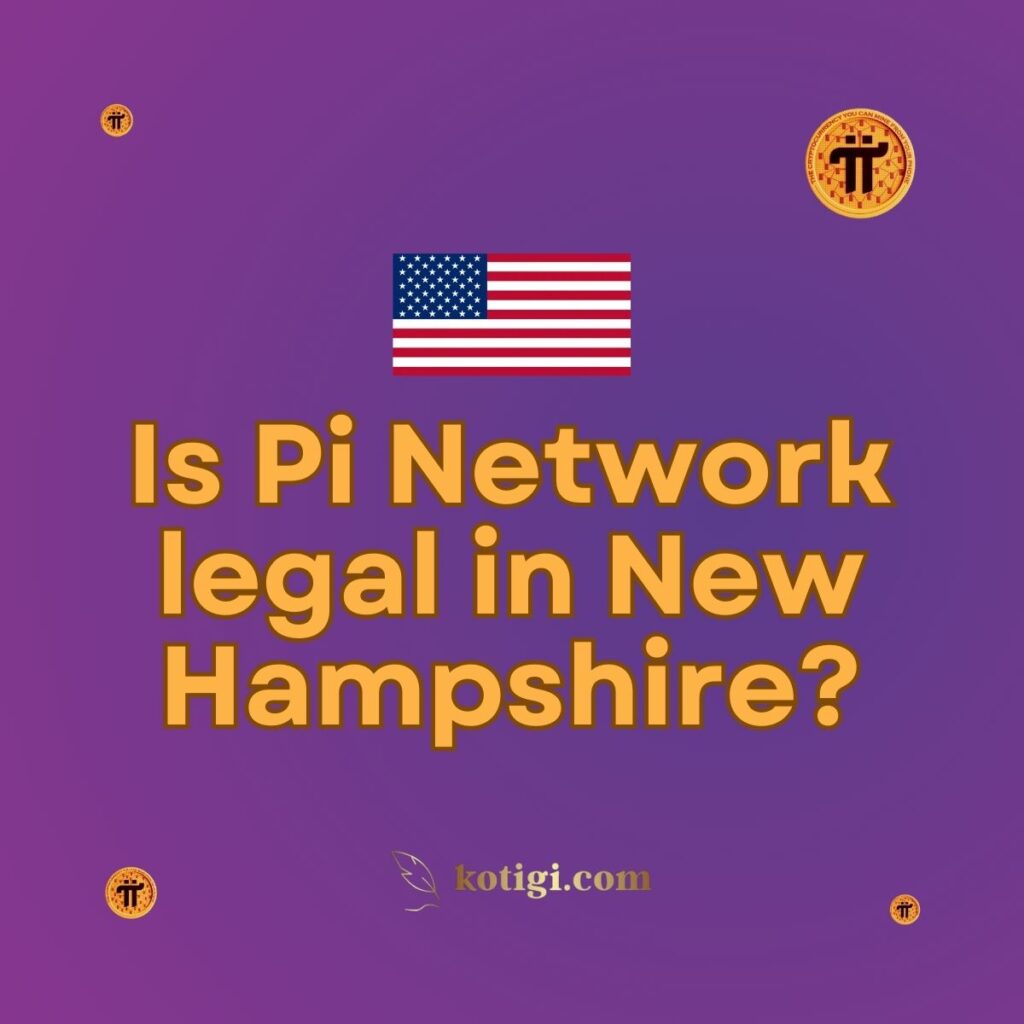
Is Pi Network legal in New Hampshire?
Yes, Pi Network is legal in New Hampshire. The state allows cryptocurrency projects to operate, with a particular focus on compliance with federal and state regulations related to financial activities. Users in New Hampshire can engage with Pi Network, as long as it adheres to anti-money laundering (AML) requirements and know-your-customer (KYC) practices.
Introduction
Pi Network, a mobile-first cryptocurrency platform, is becoming increasingly popular among users worldwide, including those in the United States. New Hampshire has historically maintained a progressive stance toward cryptocurrencies, with a robust legal framework that encourages innovation while protecting consumers. Understanding Pi Network’s legal status in New Hampshire involves exploring how the network fits into the state’s cryptocurrency regulations and compliance with financial laws.
This article delves into whether Pi Network is legal in New Hampshire by examining the state’s regulatory environment for digital assets, Pi Network’s compliance measures, and the benefits and challenges for users in the region.
1. Overview of Cryptocurrency Regulations in New Hampshire
1.1 State Approach to Cryptocurrency
New Hampshire has shown an openness to digital assets and blockchain technology, distinguishing itself as one of the more crypto-friendly states in the U.S. While cryptocurrencies are generally allowed, businesses and projects dealing in digital assets must follow federal and state-level financial regulations to ensure legality.
1.2 New Hampshire’s Financial Laws for Crypto Projects
Cryptocurrency platforms operating within New Hampshire must adhere to laws aimed at preventing financial crime, such as the Bank Secrecy Act (BSA) and anti-money laundering (AML) regulations. In addition, they are expected to implement KYC processes, a measure Pi Network incorporates to verify user identity and maintain compliance.
1.3 Regulatory Authorities Involved
The New Hampshire Banking Department oversees financial services within the state, ensuring compliance with both state and federal laws. Additionally, the Financial Crimes Enforcement Network (FinCEN) is involved at the federal level, requiring cryptocurrency platforms to comply with guidelines that prevent illegal financial activities.
2. Pi Network’s Compliance with New Hampshire Laws
2.1 Implementation of KYC Processes
Pi Network’s approach to compliance includes a mandatory know-your-customer (KYC) system that verifies the identity of its users. This KYC process aligns with New Hampshire’s requirements for transparency in cryptocurrency operations, helping to reduce risks of fraud and misuse.
2.2 Adherence to AML Regulations
As part of its legal obligations, Pi Network complies with anti-money laundering (AML) requirements, preventing illicit activities on its platform. By screening users and monitoring transactions, Pi Network contributes to a safer and legally compliant environment, in line with New Hampshire’s regulations.
2.3 Data Privacy Compliance
In addition to AML and KYC, Pi Network follows stringent data privacy guidelines to protect user information. These measures are essential to maintaining legal and ethical standards, as data privacy remains a high priority for both New Hampshire and federal authorities.
3. Advantages of Pi Network for Users in New Hampshire
3.1 Easy Access to Cryptocurrency
Pi Network’s mobile mining approach allows New Hampshire residents to participate in cryptocurrency without the need for expensive mining equipment. This accessibility aligns with the state’s support for financial innovation and broadens access to cryptocurrency among a diverse population.
3.2 Increased Financial Inclusion
New Hampshire’s financial landscape benefits from platforms like Pi Network, which promote financial inclusion by allowing more people to engage in cryptocurrency without high upfront costs. This aligns with the broader mission of Pi Network to democratize access to digital currencies.
3.3 Educational Opportunities
With New Hampshire’s favorable approach to cryptocurrency, residents can benefit from the educational aspects of Pi Network, which provides resources and community engagement for understanding blockchain technology and digital assets.
4. Challenges Pi Network May Face in New Hampshire
4.1 Regulatory Changes
Cryptocurrency regulations are continually evolving, and New Hampshire is no exception. As new federal or state-level regulations emerge, Pi Network may need to adapt to maintain compliance. Staying aligned with regulatory updates will be essential for the network’s continued operation in the state.
4.2 Public Perception
While cryptocurrency adoption is growing, some residents may still hold reservations about digital assets due to misconceptions or concerns over privacy and security. Building trust and educating users about Pi Network’s compliance with local laws can help overcome these challenges.
4.3 Long-term Compliance with AML and KYC
Pi Network’s commitment to KYC and AML practices is vital, but as its user base grows, the network must continue to enhance these processes to meet the demands of regulators and ensure legal compliance. Ongoing updates to KYC technology and AML monitoring are necessary for sustained legitimacy in New Hampshire.
5. Comparison with Other Cryptocurrencies in New Hampshire
5.1 Bitcoin and Ethereum’s Regulatory Standing
Bitcoin and Ethereum, the most widely known cryptocurrencies, are legal in New Hampshire but must also adhere to AML and KYC requirements. Pi Network’s unique mobile mining feature differentiates it from these platforms, providing an alternative that does not require high-powered mining equipment.
5.2 Environmental Impact
Pi Network’s mobile mining model uses significantly less energy compared to Bitcoin and Ethereum, which aligns with New Hampshire’s focus on environmental sustainability. For users interested in energy-efficient cryptocurrency solutions, Pi Network offers a viable alternative.
5.3 Adoption Rates and Accessibility
While Bitcoin and Ethereum are more widely recognized, Pi Network’s accessible model may make it more attractive to newcomers in New Hampshire’s cryptocurrency space. Its simple, user-friendly interface and low entry barrier may lead to increased adoption among residents.
6. Future of Pi Network in New Hampshire
6.1 Expanding Local Partnerships
As Pi Network grows, potential partnerships with businesses and educational institutions in New Hampshire could foster wider acceptance and use of the platform. Collaborations could include local merchants accepting Pi as a form of payment or educational programs about blockchain technology.
6.2 Enhanced Regulatory Compliance
The future of Pi Network in New Hampshire will depend on its ability to stay aligned with changing regulations. This includes continuous improvements to its KYC, AML, and data privacy protocols. By proactively adapting to regulatory changes, Pi Network can maintain its legal status in New Hampshire.
6.3 Community Engagement Initiatives
To strengthen its foothold in New Hampshire, Pi Network could implement community initiatives that promote blockchain education and user engagement. Such programs would build trust and create a sense of belonging among New Hampshire users, potentially increasing platform adoption.
7. User Experience with Pi Network in New Hampshire
7.1 Ease of Access
The Pi Network mobile app is readily accessible to users in New Hampshire, allowing them to start mining Pi with minimal setup. This low barrier to entry is particularly attractive in a state that encourages technological accessibility and inclusivity.
7.2 Security Features
Pi Network’s robust security protocols ensure a safe user experience, which is crucial for maintaining compliance with New Hampshire’s cryptocurrency regulations. By emphasizing secure user transactions, Pi Network fosters confidence among its users.
7.3 Opportunities for Community Involvement
Pi Network’s community-oriented approach enables New Hampshire users to connect with a broader global community. By participating in this collaborative network, users can gain insights and contribute to the platform’s growth, enriching their cryptocurrency experience.
Conclusion
In New Hampshire, Pi Network operates legally, as long as it adheres to applicable regulations. The platform’s compliance with AML and KYC requirements ensures that it aligns with both federal and state laws. As Pi Network continues to grow, it must remain vigilant about regulatory changes to ensure its sustained legality in the state.
Pi Network’s unique mobile mining approach, combined with its accessibility and commitment to compliance, positions it as an attractive option for New Hampshire residents interested in exploring cryptocurrencies. With ongoing adaptations to its security and compliance measures, Pi Network is well-positioned for continued success in the state.
Key Takeaways:
- Pi Network is legal in New Hampshire, provided it follows AML, KYC, and data privacy requirements.
- The platform’s mobile mining model makes it accessible and environmentally friendly, aligning with local interests.
- Ongoing regulatory changes pose a challenge, making continuous compliance updates essential.
- Pi Network offers educational and community engagement opportunities, promoting cryptocurrency awareness.
- New Hampshire users benefit from a secure and compliant platform that encourages financial inclusion.





